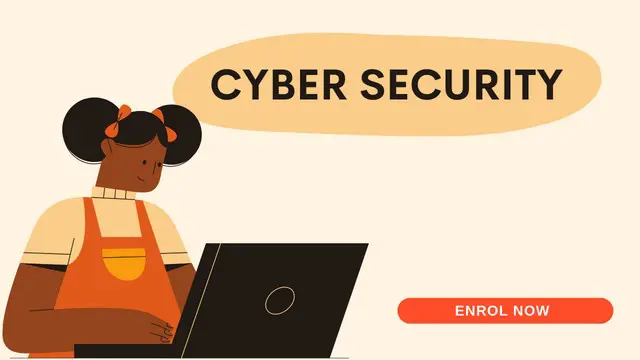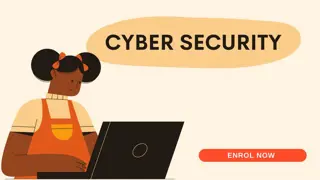
Diploma in Cyber Security Level 5
Explore Now | eBook Method | Exclusive Learning Materials| FREE Certification by REED| Lifetime Access | 24/7 support
EDURISE
Summary
- Certificate of completion - Free
- Reed courses certificate of completion - Free
- Tutor is available to students
Add to basket or enquire
Overview
In today's digital age, the demand for cybersecurity expertise is greater than ever. Protecting sensitive data, securing online operations, and safeguarding against cyber threats have become paramount. As a professional or business owner, your ability to navigate the cyber landscape safely is critical. That's why our "Cyber Security Masterclass" offers essential knowledge and insights into the world of cybersecurity to empower you and your business.
1. Stay Ahead of Cyber Threats: In an era where cyber threats are ever-evolving, having a strong understanding of cybersecurity is your best defense. Our Cyber Security Masterclass equips you with the knowledge to identify and mitigate potential threats before they can harm your digital assets.
2. Secure Your Business: Cyberattacks can disrupt business operations, steal valuable data, and damage a company's reputation. With our masterclass, you'll learn the techniques and strategies to protect your business from cyber threats, ensuring continuity and trust.
3. Empower Your IT Team: For IT professionals, this course is a valuable resource to enhance your cybersecurity skills and stay up-to-date with the latest security trends. You'll become an indispensable asset to your organization by helping implement robust cybersecurity measures.
4. Protect Personal Data: Safeguard your personal information, financial details, and online identity. The course provides practical insights to secure your online presence, making it invaluable in an era of increasing personal data breaches.
5. Understand the Legal Landscape: Module 5 delves into the legal, ethical, and professional aspects of cybersecurity. This knowledge ensures that you are aware of your rights and responsibilities in the digital world, making it ideal for compliance and legal professionals.
6. Stay Competitive: In a competitive job market, having a fundamental grasp of cybersecurity can set you apart from other candidates. Whether you're looking to switch careers or advance in your current role, this expertise is a valuable addition to your skill set.
7. Startup Founders: Founders of tech startups can enhance the security of their ventures from the outset. By grasping cybersecurity principles, you can avoid costly data breaches and establish trust with your customers.
8. Non-Technical Professionals: You don't need a technical background to understand the basics of cybersecurity. This course is designed to be accessible to a wide audience, making it perfect for non-technical professionals who handle sensitive data.
9. Inform Decision-Making: Managers and decision-makers can use the insights from this masterclass to make informed choices regarding investments in security measures and technologies, ensuring that resources are utilized effectively.
10. Protect Your Future: In a world where our lives are increasingly online, understanding cybersecurity is a skill that will continue to grow in importance. This course is your gateway to a safer and more secure digital future.
In conclusion, our "Cyber Security Masterclass" is not just a course; it's a powerful tool that empowers individuals, businesses, and professionals to navigate the digital world safely and confidently. Join us to take the first step towards a secure and resilient digital future.
Free Gift
- Course Completion PDF Certificate
- Tutor Support
Curriculum
Course media
Description
Module 01: Introduction to Cyber SecurityLearning Outcomes:
- Understand the fundamental concepts and importance of cyber security in the digital age.
- Identify common threats and vulnerabilities that exist in the online world.
- Comprehend the key principles and strategies for protecting digital assets and data.
Module Description: In this introductory module, you will gain a foundational understanding of cyber security. You'll explore the significance of safeguarding digital information and learn about the basic terminology and concepts used in the field. This module sets the stage for the subsequent learning by providing a comprehensive overview of the cyber security landscape.
Module 02: Attacks, Techniques, & MotivationLearning Outcomes:
- Recognize various types of cyberattacks and their potential impact.
- Analyze the motivations behind cyberattacks and the psychology of threat actors.
- Explore the techniques and methods used by cybercriminals to exploit vulnerabilities.
Module Description: In this module, you will delve into the dark world of cyberattacks. You'll learn to differentiate between different attack vectors and understand the motives that drive cybercriminals. By studying their techniques and methods, you'll be better equipped to defend against cyber threats.
Module 03: ExploitationLearning Outcomes:
- Grasp the principles of vulnerability assessment and exploitation.
- Learn how attackers leverage vulnerabilities to gain unauthorized access.
- Understand the tactics used in exploitation and how to defend against them.
Module Description: This module focuses on the critical phase of cyber exploitation. You'll discover how vulnerabilities are identified and exploited, gaining insights into both offensive and defensive strategies. Understanding exploitation is vital for creating robust security measures.
Module 04: Malicious CodeLearning Outcomes:
- Identify various forms of malicious code, including viruses, worms, and malware.
- Explore the mechanisms through which malicious code infiltrates and affects systems.
- Learn strategies for detecting, removing, and defending against malicious code.
Module Description: Malicious code is a pervasive threat in the digital realm. This module delves into the world of computer viruses, worms, and malware. You'll gain knowledge of how these threats operate and the measures to mitigate their impact.
Module 05: Legal, Ethical & Professional PracticeLearning Outcomes:
- Comprehend the legal and ethical considerations in cyber security.
- Recognize professional standards and practices within the field.
- Understand the obligations and responsibilities in maintaining legal and ethical cyber behavior.
Module Description: Ethical and legal considerations are paramount in the realm of cyber security. In this module, you will explore the legal frameworks and ethical guidelines that govern cyber practices. You'll learn about the professional standards that practitioners must adhere to.
Module 06: Present day toolsLearning Outcomes:
- Familiarize yourself with contemporary tools and technologies used in cyber security.
- Gain practical experience in utilizing tools for threat detection, prevention, and response.
- Understand the role of automation and AI in modern cyber security.
Module Description: This final module introduces you to state-of-the-art tools and technologies used in the field of cyber security. You'll have the opportunity to work with real-world tools for threat detection, prevention, and incident response. This practical experience equips you with hands-on knowledge that is essential for success in the cyber security landscape.
Certificate of Completion
After completing the Cyber Security diploma course, you will be able to obtain your free PDF certificate of course completion.
Who is this course for?
Ideal Audience:
IT Professionals: IT specialists, including network administrators, system administrators, and software developers, who want to enhance their understanding of cyber security to protect their organization's assets.
Cyber Security Enthusiasts: Individuals who are passionate about cyber security and want to deepen their knowledge in this field.
Small Business Owners: Entrepreneurs and small business owners who need to safeguard their company's digital assets from potential threats and vulnerabilities.
Managers and Decision Makers: Managers and decision-makers looking to make informed choices about cyber security strategies and investments within their organizations.
Students and Graduates: Students pursuing careers in IT, computer science, or cyber security who aim to establish a strong foundation in the subject.
Non-Technical Professionals: Non-technical professionals who are interested in understanding the fundamentals of cyber security to ensure their online safety and protect their personal data.
This course caters to a diverse audience with varying levels of technical expertise. It provides a solid grounding in cyber security principles and practices, making it suitable for those both inside and outside the IT field who wish to grasp the essentials of protecting digital systems and information.
Requirements
The Cyber Security course has no formal entry requirements.
Career path
Cyber Security Analyst: In the UK, the average salary for a Cyber Security Analyst can range from £25,000 to £45,000
Cyber Security Consultant: Salaries for Cyber Security Consultants in the UK typically range from £45,000 to £70,000
Chief Information Security Officer (CISO):In the UK, CISOs can earn salaries ranging from £80,000 to well over £100,000
Questions and answers
Currently there are no Q&As for this course. Be the first to ask a question.
Certificates
Certificate of completion
Digital certificate - Included
Reed courses certificate of completion
Digital certificate - Included
Will be downloadable when all lectures have been completed
Reviews
Currently there are no reviews for this course. Be the first to leave a review.
Legal information
This course is advertised on reed.co.uk by the Course Provider, whose terms and conditions apply. Purchases are made directly from the Course Provider, and as such, content and materials are supplied by the Course Provider directly. Reed is acting as agent and not reseller in relation to this course. Reed's only responsibility is to facilitate your payment for the course. It is your responsibility to review and agree to the Course Provider's terms and conditions and satisfy yourself as to the suitability of the course you intend to purchase. Reed will not have any responsibility for the content of the course and/or associated materials.


